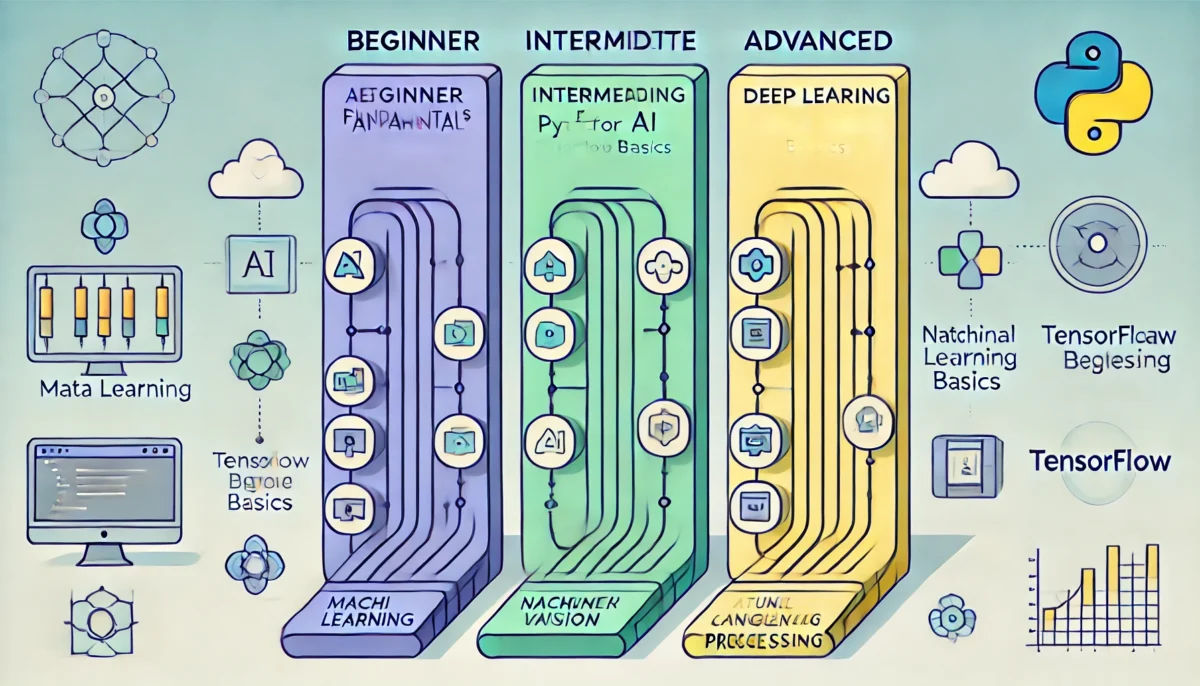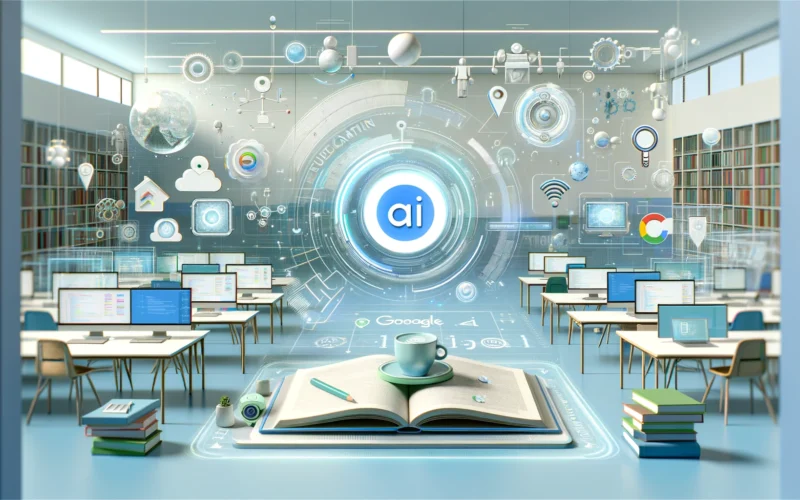In the fast-paced world of artificial intelligence, staying ahead of the curve is crucial. Google, a pioneer in AI technology, offers a comprehensive suite of AI education resources. This guide explores the Google AI learning platform, providing insights into the diverse artificial intelligence training options available in 2024.
Key Takeaways:
- Discover how Google is shaping the future of AI learning
- Explore options from free online AI classes to rigorous certification programs
- Learn how to advance your career with Google’s AI education initiatives
CHECK: Google AI Courses for Beginners: Your Ultimate Guide | Learn AI
Understanding Google’s AI Education Ecosystem
Google’s commitment to AI education is reflected in its diverse learning resources. Let’s explore the multi-faceted approach to AI training that caters to learners at all levels.
Types of Learning Resources Available
- Online Courses
- Introductory AI and machine learning basics
- Advanced deep learning and TensorFlow tutorials
- Hands-on Labs
- Interactive sessions for applying theoretical knowledge
- Real-world scenario simulations
- Certification Programs
- Professional certificates
- Specialization tracks
- Workshops and Webinars
- Live sessions with industry experts
- Recorded webinars for flexible learning
- Documentation and Guides
- Comprehensive, self-paced learning materials
- Reference guides for Google AI tools
Free vs. Paid Options
| Free Resources | Paid Programs |
|---|---|
| Foundational courses | Advanced certifications |
| Basic learning materials | Specialized tracks |
| Introductory workshops | In-depth training |
Learning Platforms and Delivery Methods
- Google Digital Garage
- Coursera
- YouTube (AI Adventures series)
- Google Cloud Training
- TensorFlow website
Google’s Diverse AI Education Programs
Google AI Certificate Programs
- Google Career Certificates
- Data Analytics
- IT Automation
- TensorFlow Developer Certificate
- Professional Machine Learning Engineer Certification
Google DeepMind Education Initiatives
- DeepMind Scholarships
- University collaborations
- Open-source learning resources
Getting Started with Google AI Learning
Prerequisites
Before diving into Google’s AI courses, ensure you have:
- A modern computer with stable internet
- Updated web browser (Chrome, Firefox, Safari, or Edge)
- Basic understanding of mathematics and programming (recommended)
Choosing Your Learning Path

- Beginner Pathways
- AI Fundamentals
- Python for AI
- TensorFlow Basics
- Intermediate Routes
- Machine Learning Specialization
- Deep Learning
- Natural Language Processing
- Advanced Specializations
- TensorFlow Advanced Techniques
- AI for Cloud
- Computer Vision
- Career-specific Tracks
- Data Scientist Path
- Machine Learning Engineer Track
- AI Researcher Path
Learning Experience Deep Dive
Course Structure
Most Google AI courses follow this structure:
- Weekly modules
- Progressive learning
- Balance of theory and practice
Time Commitments
- Beginner courses: 3-5 hours/week
- Intermediate courses: 5-8 hours/week
- Advanced courses: 8-12 hours/week
Assessment Methods
- Regular quizzes
- Programming assignments
- Peer-reviewed projects
- Final exams
Career Development & Opportunities
Industry Recognition
Google AI certifications are highly regarded in the tech industry, offering:
- Credibility
- Skill validation
- Up-to-date knowledge
Job Prospects
- Entry-level AI/ML: $70,000-$100,000.
- Mid-level positions: $100,000 – $150,000
- Senior AI/ML Engineers: $150,000 – $250,000+
- AI Research Scientists: $120,000 – $300,000+
Practical Application & Portfolio Building
Real-World Project Ideas
- Sentiment analysis tool for social media marketing
- Image recognition system for inventory management
- Predictive maintenance model for manufacturing equipment
- Natural language processing chatbot for customer service
- Anomaly detection system for financial fraud prevention
Industry-Specific Applications
- Healthcare: AI-powered diagnostic tools
- Finance: Algorithmic trading models
- Retail: Personalized recommendation engines
- Manufacturing: Quality control systems using computer vision
- Environmental: Climate change prediction models
Comparative Analysis
Google AI Courses vs. Competitors: A Detailed Look
| Feature | Google AI | IBM AI | Coursera AI | AWS AI |
|---|---|---|---|---|
| Focus | Practical implementation | Enterprise solutions | Academic breadth | Cloud integration |
| Tools | TensorFlow, Google Cloud | Watson | Varied | AWS services |
| Certification Recognition | High in the tech industry | Strong in the IBM ecosystem | Widely recognized | Valued in cloud roles |
| Pricing Model | Many free options | A mix of free and paid | Subscription-based | Pay-per-certification |
| Hands-on Experience | Google Cloud emphasis | IBM Cloud emphasis | Varied | AWS emphasis |
| Learning Curve | Gentle for beginners | Steeper | Varies by course | Moderate to steep |
AI Course Platform Comparisons
Google AI vs. IBM AI Courses
- Content focus: Google emphasizes practical implementation, while IBM courses often have a stronger enterprise focus.
- Tools: Google courses center around TensorFlow, while IBM focuses on Watson.
- Certification recognition: Both are well-recognized, with Google potentially having an edge over pure tech companies.
Google AI vs. Coursera AI Programs
- Course variety: Coursera offers a wider array of AI courses from multiple institutions, while Google’s offerings are more focused.
- Pricing: Google offers more free content, while Coursera’s model is primarily subscription-based.
- Hands-on experience: Google courses provide more direct experience with Google Cloud tools.
Google AI vs. AWS AI Certification
- Cloud focus: AWS certification is closely tied to their cloud services, while Google’s courses offer a mix of general AI and Google Cloud-specific content.
- Job market: Both are valuable, with AWS potentially having an edge in cloud-heavy roles, while Google may be preferred for general AI positions.
- Learning curve: Google’s courses often have a gentler learning curve for beginners.
Detailed Pricing and ROI Analysis
Investment Breakdown
- Free courses: AI Fundamentals, Intro to TensorFlow
- Paid certifications:
- TensorFlow Developer Certificate: $100
- Professional Machine Learning Engineer: $200
- Specialization tracks: $39-$79/month
ROI Projections
- Potential salary increases post-certification: 15-30%
- Career advancement opportunities:
- 68% of graduates reported promotions within 6 months
- 82% felt more competitive in the job market
Time-to-Value Analysis
- Average completion time vs. career benefit onset
- Long-term skill relevance in the rapidly evolving AI landscape
Success Stories & Testimonials
Career Transformation Spotlight
“After completing Google’s AI courses, I transitioned from a data analyst to a machine learning engineer at a Fortune 500 company. My salary increased by 40%, and I’m now leading AI initiatives.”
- Sarah K., Former Data Analyst
Startup Success Story
“Our startup leveraged the skills gained from Google’s AI program to develop a revolutionary crop yield prediction model. We’ve since secured $2 million in funding and are expanding globally.”
- Alex T., AgriTech Entrepreneur
Big Tech Breakthrough
“Google’s advanced TensorFlow courses gave me the edge I needed. I now work on Google’s AI research team, contributing to cutting-edge projects that shape the future of AI.”
- Michael R., AI Research Scientist at Google
FAQ Section
[sp_easyaccordion id=”6399″]
Additional Resources
Supplementary materials
Advanced learning paths
- Google Cloud-certified Professional Machine Learning Engineer
- Advanced TensorFlow specialization
- AI for medical diagnosis and treatment
Community forums
- Google Developers community: Connect with peers and experts
- Stack Overflow: Find solutions to technical challenges
- Kaggle: Participate in AI competitions and discussions
Industry connections
- Google Developer Groups: Local meetups and events
- AI conferences and workshops sponsored by Google
- Google for Startups: Resources for AI-focused entrepreneurs
Conclusion & Next Steps
Action plan
- Assess your current skills and career goals
- Choose an appropriate learning path
- Start with foundational courses if you’re new to AI
- Progress to specialized tracks aligned with your interests
- Apply your skills through projects and build your portfolio
- Network with peers and industry professionals
- Stay updated with the latest AI trends and Google resources
Getting started guide
- Visit the Google AI education portal
- Take a skills assessment test if available
- Enroll in a beginner-friendly course to understand the learning platform
- Set a consistent study schedule
- Engage actively in course forums and discussions
